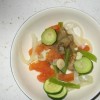Kids are picky eaters? What do you do?
This is a subject that I am curious about; however, I don't have any experiences with which to form an opinion. I don't have kids. Any clues as to why a kid will reject a food on sight/smell? Do you coax them? Do you just make that the only food available until hunger overpowers the resistance? (I remember Mom trying that one; but, I outlasted her. Okay, I have some experiences to work with. Most are just fuzzy memories.) Do you hide the food in food they like? Are they using food to test your resolve? All comments are welcome.
I would eat pretty much anything put in front of me, except mashed potatoes that I now love! My three children were very picky as they were growing up - I have no idea why. My older two put Koolaid in the younger one's milk and told him it was strawberry milk - he never drank milk for years after that. Only now does he drink choocolate milk but lots of cheese - yeah. Myabe it's a personality thing - who knows.
Koolaid in the milk? Sounds like something I would have done to my sister, when I was a kid - of course.
The early experiences seem to be important.
Hi Leroyworld-
My kid were never picky eaters. They ate pretty much everything my wife and I ate, including some pretty exotic dishes as a matter of course. On the rare occasion where something just didn't pass their smell test. They didn't eat it. Heck everyone has likes and dislikes.
From a broader perspective, stongly flavored, pungent smells, and certain spices (particularly hot, or tart) can trigger an immediate rejection from a child. Very small portions, that are not overwhelming, and coupled with foods they like, can often make it into small mouths for a sample.
Now, the sight of certain foods may also illicit a "no thank you". Colors that bring to mind unpleasant things and situations can do the same for eating. An out of hand rejection of some vivid colored or colors remnicient of unpleasant feelings, is a reasonable response.
Lastly, and perhaps most importantly, I found that the feel of certain foods bothin the mouth and in the hand, could trigger the most vehement negative responses.
Psychologically, change or something new, can be intimidating and take a while (and comfortable setting) to overcome.
So, just lilke adults, children will have likes and dislikes. These will evolve over time and should be honored just like you would like your likes an dislikes honored.
Just hang loose. A hungry child will eat. There is no reason to set any sort of schedule to "boraden the child's palate". Eating should be fun and satisfying - not a war of wills.
-DWThank you for this thoughtful response. The feel of food in the hand was not something I would have considered a factor.
Kids are no different than any other person. I am sure there are foods you don't like, even now as an adult right? I think it is wrong to force your child to eat something they hate, and often times a child will refuse a certain thing only to find out later that they are allergic to it when it was forced upon them. Food has a lot of psychological attachments and you don't want to cause problems by forcing foods or witholding foods.
Here is my take on food at home with my 5 kids...
1. Offer variety early on. My kids spend little to no time with baby food. They learn to eat what we eat within a couple months of eating food.
2. We have a one bite rule. You must take one bite of everything. That way they aren't forced to eat a whole portion, but are exposed to new foods and hopefully will learn to like them.
3. Offer variety. I know what my kids will and will not eat. So if we are having something I *know* one doesn't like I make sure the sides are things they do like. So my rice hater will fill up on peas (yes, mine love veggies) and fruit. He won't be as full, but won't go hungry either.
4. I am not a restaurant. You get what I make and I don't make different meals for everyone. This is a major problem for some who give in and give their kids PB&J all day everyday and then wonder why they won't eat anything else.Sadie423, I think we live in the same house - we have the same rules on this end. We call the "one bite rule" the "thank-you bite rule."
The only rule we alter is rule #4, for my son with medical problems. If he'll eat PB&J, then he can have PB&J - anything to get the feeding tube out.Food allergies are becoming more common these days. Perhaps parents should keep notes on which foods are hated by their kids. Is that reasonable?
The one bite rule reminds me of the basic culinary class I was enrolled in. We had to taste everything at least once. The idea was to get to know the ingredient, but I suspect that the real reason was to "broaden our pallets".
I don't have kids either but, my mom would place our dish of food infront of us to eat. If we refused it for lets say dinner, it was breakfast the next day. Once a kid is hungry enough, it will eat what is there.
My mom had that attitude, except I don't think she saved anything for breakfast.
- LikaMarieposted 11 years ago
0
I wasn't a picky eater, too much, though growing up in Japan, I never ate cooked fruits, and veggies were barely cooked through.
The thought of eating fruit preserves or apple pie was so repulsive... My grandma got me to try things by explaining to me that it's always a good thing to be an explorer, because you may never discover what you like or don't like. It helped that my grandpa was kind of like Mikey who ate everything.
I eventually tried and loved different foods. My son was never a picky eater either, but I introduced new foods from the beginning, so no negative opinions could be formed about what looked, felt or smelled gross. Of course some kids go through a phase where they don't like anything, or get picky, but that's when you pull the trick of just not feeding them different, they'll eat when they get hungry.
That was the standing rule at my house too. If you didn't like what's for supper, you could make yourself one pb&j sandwich and the glass of milk you were poured for supper.Thank you. Interesting, when I was growing up the only way I would eat fruit or vegetables was if they were cooked completely through. I liked you grandmother's approach to getting kids to eat.
Her approach was genius... When ever I got to a new place, I always liked to explore my surroundings. This was her way to include the new foods, and with our country being so huge, it would be a shame to visit a new place and not try the local flavors because I didn't think it was right...
Thanks to my grandma, I will be forever expanding new ideas, not just with food, but with everything.
I agree that it is important to introduce children to a wide range of experiences including food. However it is equally important not to turn food into a source of stress for you as a parent or for your children. Turning mealtimes into a battle of wills produces no winners as it will impact on the parent/child relationship. The need to win the battle is what leads people dishing up last night,s dinner for breakfast.
When children are small parents often measure their success by the fact that their babies put on weight so a fussy small child can cause a feeling of failure and put lots of pressure on the parent to get the child to eat. Children quickly pick up on what pushes their parents buttons! Therefore a relaxed approach is best. Small children learn through their senses so what food feels like is equally important. Try involving children in growing and preparing food if possible as it becomes a whole experience.The idea of involving kids in growing and preparing food is great; but, I have ran into a lot of parents who do not know how to do either task.
I know what you mean but it can be as simple as making a sandwich, it doesn't have to be a three course meal! It also helps children to become responsible if they learn to do things for themselves. Parents (including myself) go on doing things for years that children can do for themselves.
Kids like to eat simple things - they don't want to be overwhelmed and they like to know what it is - fruits sliced - not sauced, for example. If you offer only two or three things at a time (depending on age, maybe only one thing) it is best. They can really enjoy eating if you make the eating time pleasant - soft background music - no adults arguing, quietness and everyone enjoying themselves. What you do makes the difference, and if you eat healthy simple foods - not something different than they are eating, but the same mostly - they will believe in the foods you are giving them. It is really important that you don't make a big deal out of it, but show them by what you eat, how you eat, and when you eat. What is best for you is for the most part going to be best for them too. I didn't have any problems with my kids being too picky. Although for awhile my oldest son wanted only round foods - grapes, other round fruits, peas, meatballs, etc. He was so obsessed with balls, but this only lasted a couple weeks when he was about 2. I had a lot of fun with my kids later on in the kitchen having them help me prepare the food - they loved to do that and they all learned to be good cooks and appreciate food of many kinds - so I know it works. If you don't have kids yet, don't worry about this - you will find out that it is very natural - eating and making food for kids. Definitely the simpler the better.
also - we are all more aware nowadays of how food allergies can begin at a very early age - and this is why it is important to have diversity - not too much wheat and refined grains and sugars - in fact, the less of this, the better. Also kids can have allergies to dairy without you realizing why they always have the sniffles. Here in America we often feed out kids far too much wheat and milk and sugar - sometimes thin little ones can't gain weight because of their diet. I really believe you can't go wrong with lots of fruits and veggies and less of the high protein, hard to digest foods. It is really the same for adults! and you can help prevent nutrition problems, obesity, allergies etc. if you just pay attention to this. NO PACKAGED FOODS! Meaning, forget the hamburger helper and the powdered cheese macaroni in the box. Forget feeding them lots of ramen noodles out of the package. It's really true, that if you shop around the edges of the store, stay out of the middle aisles mostly, you'll all be healthier!
I wonder if food shapes are a common obsession in a kid's growth.
I agree with you about the packaged foods, although my parent fed me a lot of the Kraft Mac and Cheese growing up. I have recently learned a recipe for mac and cheese from scratch, so I don't miss the mac and cheese as much. It's hard to change lifelong habits.
Make the food colorful (veggies are colorful) and cut them with those vegetable cutter with nice designs and tell them it is what their fav cartoon character eats!
Kids still watch cartoons? I guess some things don't change. From what I know about food, color usually means raw, or lightly cooked, fruits and vegetables.
Children can also eat raw veggies like carrots. I just wash it thoroughly. My daughter likes broccoli and I steam it.
And yes, they still watch cartoons
yes, it is hard to change habits, I really know about this. When I was young I thought the things that were fattening and bad for me were "rewards" and it is hard to get over those cravings - so that's why it is important to start the good habits early - from the beginning. Not only will they learn which are best for them to eat - when they shop with you they find out how to buy the best. Fun to go direct to the farmers - the farmer's market or local farm stands and they see exactly how to get the best. We are very lucky to have lots of good local food of all kinds, and it is getting better and better. Much easier to buy organic now. Good habits start early - that way they won't have cravings for things that aren't good.
When our daughter was about 18 months old she stopped eating. Our doctor told me to put the food in front of her and walk away. I did that and she started eating on her own, she just didn't want me standing over her or feeding her. She had decided she was a big girl.
Someone said don't make food stressful and that is true. Our boys were picky eaters. I worried, the doctor said not to worry they would eat. There was no way they were going to starve. I also made sure at meals I had something they liked and we all would eat. The boys are now big boys.
Sometimes tricks work if your just trying to get something in them. When our oldest was a toddler. For a snack I gave him cheese in an ice cream cone. Otherwise he would not eat the cheese.just thought of something - there are going to be foods your kids don't like and won't eat - but that doesn't mean they have to eat them - you can always find other things that will provide the vitamins and minerals they need. You can also give them supplements - a simple multi-vitamin will work - my kids loved the chewy ones. That way you don't have to be a food cop and worry so much!
We never worried too much about how much the kids ate, I had seen some seriously picky eaters and figured it was normal. We had to deal with food allergies too so we mostly let them decide if they wanted all of their dinner or not. They had a three time rule though - they had to try one bite of a food three times over the course of however often we had it; if they still didn't like it, we didn't make them eat it anymore. We made sure to point out that their tastes would and had changed over time too. They started to notice that for themselves, that a food they hadn't liked before tasted pretty good a few months later. We talked about nutrients their bodies needed more of at certain times.
One other thing to consider: sometimes it's a matter of misunderstanding! My baby brother was appalled when he was made to try "cold slop"; he couldn't believe his beloved mother would insist on that! It was "cole slaw".
My son was devastated when he thought I was making him try "sour crap", otherwise known as "sauerkraut". We explained, he tried it, but honestly for a kid, it did still taste like sour crap!We tend to not worry too much with our son either even though he is a picky eater. We will make him try it, but I know from my own experience as a picky eater that it does no good to fight a child who won't eat something. He has a strong gag reflex in that if it taste bad to him then he gags. I had the same problem so I know he isn't doing it on purpose. He will truly try to eat it while the whole time he is gagging.
It wasn't until I was in my early 20s really that I started to branch out and try new foods. Now I love to try new things, especially foods from other countries. One type of food I am still not a big fan of is a lot of southern cooking, and I am from and still live in the American South.
My oldest son, now 12 was a picky eater when he was younger. i researched different cookbooks about how to hide foods with other foods that your kids love. (that sort of thing) i started to make things like spinach with apples. it had such a sweet taste, he loved it. when i made spaghetti, i put ground up carrots and zucchini and things like that in it. after a while, he acquired the taste for the food that i was cooking (and i did not give him any other choice but what i cooked). he now eats all the veggies that i hid in foods even when i do not hide them. i hope that helps!
I think spinach and apples is a great classic combination, especially in salads. I can see why your son would like that taste. Trust seems to be a common element inferred in all of these comments. To me a test of wills, suggests a lack of trust on one of the two parties. Just my thoughts.
There is a lot of good advice in this thread. My pediatrician advises not to let eating and meals become a power struggle, like others mentioned, and I think that is important. He told me to keep their food as healthy as possible but not to force anything, and to give my kids a multivitamin to make up for the veggies they weren't eating.
One trick my own mom used was to make spaghetti sauce full of cooked, pureed carrots and squash. You couldn't see them, because they blended right into the tomato sauce. The sauce was also full of tomatoes and Italian spices, so it tasted just like regular tomato sauce.
A trick that worked on my own kids when they were little was feeding them "puppy food" and "kitty food." If it was lunch time or snack time (not an evening family meal), they would crawl around on their hands and knees, barking or meowing, and come begging to me for bites of food. I would feed them as if they were pets, one bite at a time, and pat their heads. I cannot begin to tell you how many bites of fruits and veggies they ate that way!
I read somewhere that a picky palate is actually a protective mechanism, to help keep kids from eating poisonous berries or what have you. I don't know if that's true. If so, it would explain why so many kids are picky eaters.
Another factor is that some kids have sensory issues. Kids who are oversensitive to sensory stimuli will not be able to tolerate foods that they feel are too gooey, too rough, too hot, too cold, too sour, too spicy, too pungent or whatever. It is frustrating for parents and it seems like the kid is just being difficult or making things up, but to the child it is very real. Your child might just be pushing your buttons and turning food into a power struggle, but if he is the type that hates scratchy tags in his clothes, can't stand lound noises, or does not enjoy the sensation of riding on a slide or a swing, he may truly have sensory issues.I like the sauce idea. Did your mom use the carrots as a substitute for sugar in the spaghetti sauce? Carrots have a lot of natural sugar in them would be a good way to replace the refined sugar most sauce recipes call for. The puppy game intrigues me.
@ Leroy... You mentioned that there must be a lack of trust on one of the two parties. I'm guessing that you mean between the parents and children. Can you explain that please?? I'm not sure that I understand what you are talking about. I guess that I just don't see where trust or lack there of fits in with small children and diets. Please explain.
Either the child is not trusting the parent to provide food that he likes or the parent is not trusting the ability of the child to adapt to new tastes/textures. This is an incomplete thought on my part. I put it out for comments.
I look at it this way, the parent knows that certain foods are bad for children; but, at first, all a child will understand is how the food tastes and feels. In order to learn, the child will have to trust the parent and the parent will have to trust that the child can learn.
I am sure that someone will have a nasty reply to the following and that is fine, that is what blogs are for. But i guess that I am just thinking like my parents. Lol. Bc I have a few friends who tell me things like, "my son will only eat soft tacos and drink coke," or something similar. The whole time I am shaking my head thinking, who is the parent?? Your child is not eating what you give them bc they know That if they hold out and act like a butt that you will give them "soft tacos and coke!!" but If you make a nutritious dinner and they refuse, they can skip a meal. A child will eat when hungry. Granted, If my child really does not like the texture of a type of food or is allergic, I will not make him eat it. But come on people... I think that it's time to take back your parental duties and stop co-patenting with your children. And vitamins are great,but nothing will come close to the nutrition that they will receive from a well balanced diet.
Good points.
I always thought vitamin supplements were never designed to take the place of food.
I have heard some nutritionists refer to soft drinks as liquid candy based on the sugar content. I wonder if people really understand this?
Related Discussions
- 18
Anything you can suggest on how to increase children's appetite
by annieloulaurel 8 years ago
I'm a mother of a 10-year old child who doesn't like to eat at all. I've done everything I can from appetite stimulant, food supplement, to complete milk powder. Still, no effect! Can anyone help, please?
- 6
What are some easy ways to help your child eat better if they are picky eaters?
by Latanya M Williams 9 years ago
What are some easy ways to help your child eat better if they are picky eaters?Healthy techniques to teach children to eat better.
- 21
Parental Favoritism
by Grace Marguerite Williams 11 years ago
When you were growing up, were you your parents' favorite or unfavorite child. If any of the aforementioned applied to you, were you affected positively or negatively by the experience. If you have children, do you have any that you consider your favorite and/or...
- 13
Should food ever be limited to a child?
by Peeples 10 years ago
Should food ever be limited to a child?My 7 year old eats more than all the other 4 people in our home put together. He literally eats from the time he wakes up until he goes to bed. If I make a meal he eats 3 adult servings. He is not unhealthy and the majority of the foods he eats are healthy....
- 18
If you could change the age at which you had your child/children, would you?
by Erin Nichols 10 years ago
If you could change the age at which you had your child/children, would you?I had my child at 21 years old, and I love her more than anything in the world, but there are times I think I'm missing out on a large part of growing up. My mom didn't have children until she was 30 and she said she...
- 6
Do you think there are certain foods that make you break out in pimples, or is t
by ladyjane1 13 years ago
Do you think there are certain foods that make you break out in pimples, or is that a myth?


















